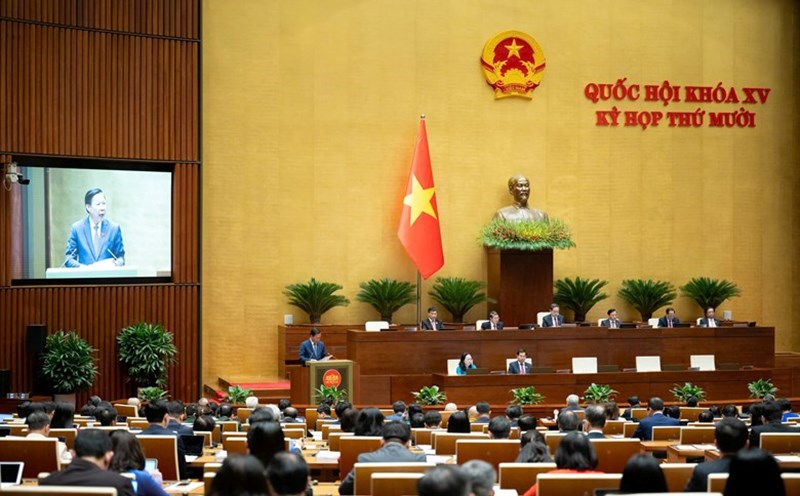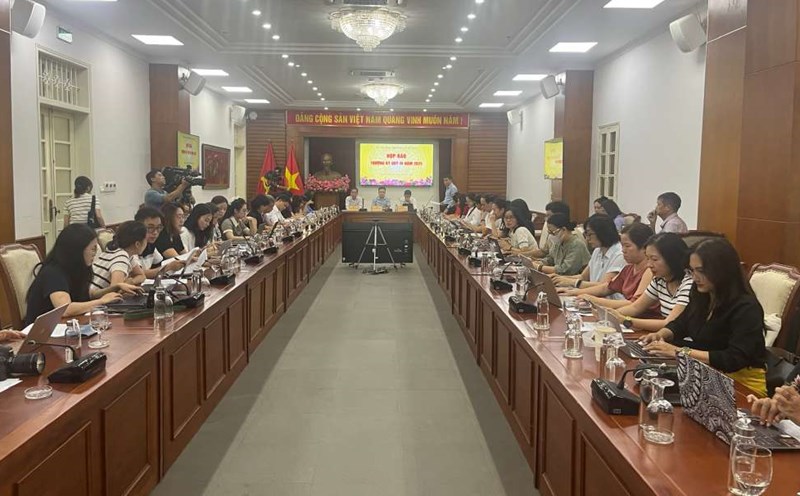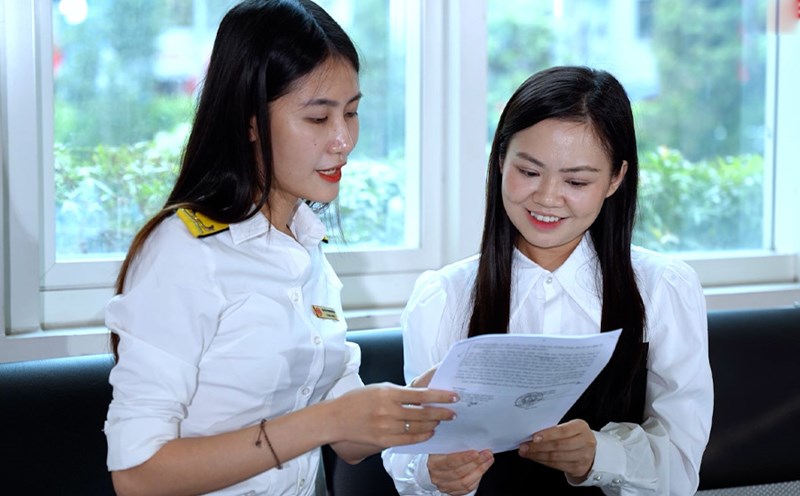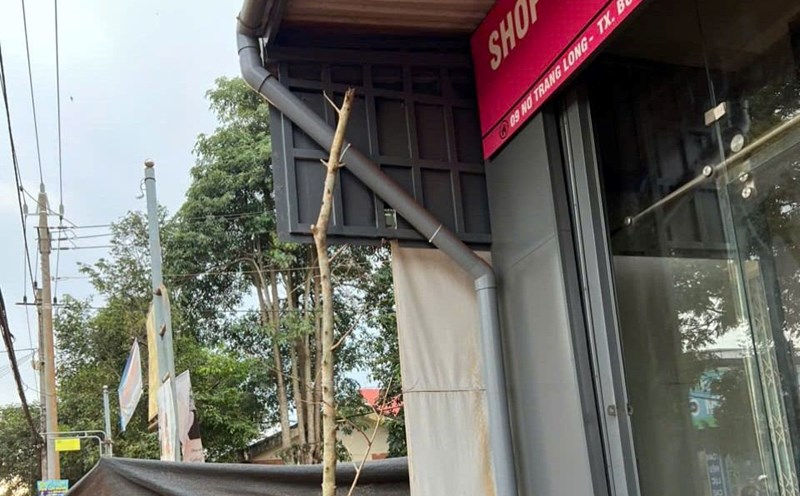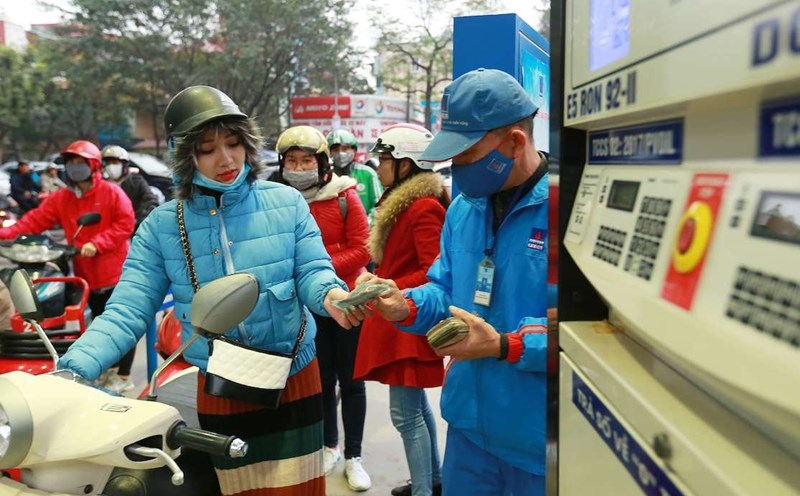Dear Director, the draft Press Law (amended) is attracting widespread attention from the press and the public. Can you generalise the most outstanding new points in this amendment? Through the newly added contents, the Press Department (Ministry of Culture, Sports and Tourism) hopes that the draft Law will contribute to building a professional, humane and modern press in the digital age, in line with the spirit of the Resolution of the 13th National Party Congress?
The amended content of the Law closely follows the 4 major groups of policies approved by the Government in Resolution 148/NQ-CP dated September 22, 2024.
First is the group of policies on strengthening state management in press activities, including perfecting the mechanism for granting licenses, suspending and revoking licenses, determining authority between the central and local governments, strictly handling violations, ending the "management gap" for some types of press.
Second is the group of policies on improving the quality of journalists and leaders of press agencies, promoting professional ethics requirements, clearly defining the rights and obligations of journalists, requiring compulsory compensation before issuing first-time journalists' cards, and at the same time adding sanctions to revoke cards for violations.
Third is the group of policies on developing the press economy, allowing the press to exploit new legal sources of revenue such as digital copyright, linking content, public communication services; creating conditions for the formation of strong key media agencies with the capacity to integrate internationally.
Fourth is the group of policies on regulating press activities in cyberspace, first included in the Law the concept of "digital content channel", "national press digital platform" and stipulates the responsibilities of press agencies when operating on digital platforms, requiring connection to electronic archive systems and compliance with laws on network security and digital data.

Notably, Article 20 stipulates the revocation of press licenses, overcoming the situation of only having administrative sanctions but not having strong deterrence measures. Articles 30 and 31 establish a legal corridor for digital journalism, stipulate the management principles and responsibilities of the national press digital platform operator, ensure a transparent and safe press space, capable of resisting the dominance of cross-border platforms.
The draft Law also strongly implements the policy of decentralization and delegation of authority. It is expected that 10 more administrative procedures related to the press will be assigned to the provincial People's Committee for handling; at the same time, when developing decrees and circulars guiding the implementation, about 20 administrative procedures will be cut, reducing from 68 to 48 procedures, contributing to simplifying conditions and saving costs for law compliance for press agencies and organizations.
In addition, the draft Law continues to affirm the position and role of the Vietnamese revolutionary press, emphasizing that the Vietnamese press is a revolutionary press, the voice of the Party, the State, socio-political organizations and a trusted forum of the people. The law adds the principle of developing journalism associated with social responsibility, professional ethics, not chasing commercialization, ensuring that journalism carries out its mission of guiding and leading information in society. The biggest goal of amending the Law is to strengthen management but create conditions for the press to develop in order and integrate without losing the revolutionary and humane nature.
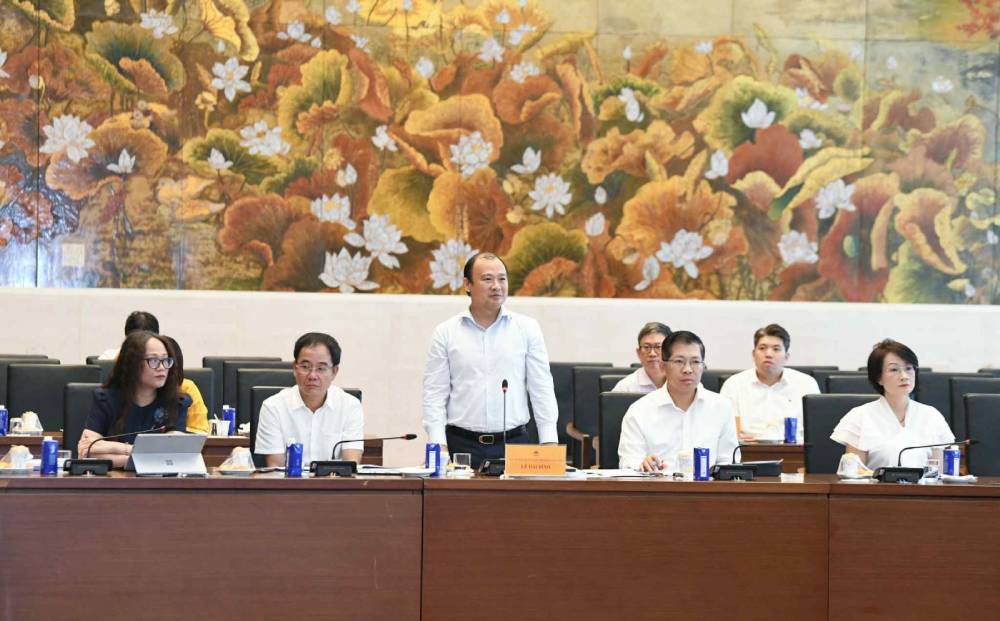
This revised Law is expected to develop and manage press activities well, towards the goal of "professional - humane - modern". Professional standards on card issuance procedures, requirements for training, transparency of the responsibility of the head, rights and responsibilities of journalists and reporters, and mechanisms for revoking licenses when violating, helping to improve the quality of journalists and handle violations more effectively. Humanitarian in the mechanism of assigning tasks, placing orders, bidding and supporting to serve information tasks for disadvantaged groups (children, the blind, remote areas...), ensuring the press performs social service functions. Modernise the legalization of press activities on digital platforms, invest in national press digital platforms and data infrastructure, monitoring, electronic records, thereby creating conditions for digital transformation, exploiting digital business models and ensuring information sovereignty in cyberspace.
Regarding the process of completing the draft Press Law (amended), how has the Drafting Committee implemented the collection of opinions and response from press agencies, professional associations and legal experts...? Are there any notable comments or recommendations or have a great impact on the completion of this draft Law, sir?
The process of drafting the Law was carried out carefully, scientifically and accurately. The Drafting Committee has organized a public consultation from ministries, branches, localities, press agencies, professional associations, and legal experts; publicly published on the Government Portal and the Ministry of Culture, Sports and Tourism.
We find that there are many enthusiastic and valuable opinions accepted in practice such as: Regarding press activities in cyberspace, press agencies propose to clearly define the mechanism of notification, storage, and supervision to avoid creating barriers, while protecting the right to editing autonomy. Regarding the development of the press economy, many opinions suggest expanding the mechanism of linkage, but it is necessary to clearly define press content with entertainment - commercial content to avoid commercializing political theme. Regarding personnel, there are concerns about tightening conditions for granting cards, so the draft has been adjusted in the direction of upgrading standards but still ensuring opportunities for young people through a systematic and flexible training program.
All comments are aimed at the common goal: A law that both ensures legality in state management and creates development momentum for the revolutionary press. Along with receiving opinions, the Drafting Committee and the editing team reviewed the Party's viewpoints on press work, especially new viewpoints to institutionalize into law, such as regulations on the model of local press and broadcasting agencies; viewpoints on decentralization, delegation of power to localities, and simplification of administrative procedures.
Articles 30 and 31 of the draft Press Law (amended) add regulations on press activities in cyberspace and the responsibility of press agencies when opening content channels in cyberspace. Can you share more clearly about this additional content, sir?
Articles 30 and 31 of the draft Law establish a legal framework for press activities on digital platforms. Accordingly, when opening content channels online, press agencies must notify state management agencies; the press must connect to a content storage and monitoring system invested by the State; must comply with the law on cyber security, own intelligence and personal data, in addition to the Press Law. In reality, the press has strongly shifted to the digital environment, but the current legal framework is not fully covered. The State needs to both create conditions for the development of digital journalism and protect the public rights and national information sovereignty.
The monitoring mechanism will be implemented through electronic records infrastructure and transparent administrative sanctions, ensuring fairness between mainstream press and cross-border platforms. This is a prerequisite for Vietnamese press to maintain its leading role in the digital media era.
In addition to the legal framework on content and social responsibility, the issue of developing the press economy is also of particular concern to the public. Director, how will those changes create conditions for the press to develop sustainably in the economy, while still ensuring the principles, purposes and political orientation? In addition, there are opinions that also propose studying the model of a group or press group, your views on this direction?
The draft Law adds many new mechanisms for press to develop sustainably in the economy such as: Recognizing new sources of revenue, including digital content copyright, cooperation linkages, public service provision; allowing the export of news content, visual news, expanding domestic and foreign markets; Establishing legal boundaries for linkage activities, strictly prohibiting linkages for political, security, national defense, and foreign news content. These regulations aim to create conditions for the press to increase financial resources to reinvest in technology and human resources, but still ensure to maintain the principles and purposes, avoiding falling into a state of commercialization.
Regarding the corporation or press group model, we believe this is an inevitable trend in the context of media convergence. However, the implementation needs to be piloted, selecting press agencies with sufficient potential, political position, leadership capacity, multi-platform model and must be placed under a specific, transparent management mechanism, ensuring the building of large, strong press agencies with a controlling role, but avoiding concentrating information power.
Currently, the name is determined based on the Press Development and Management Planning approved by the Politburo, which is "Multi- media main media agency". This agency is expected to have a special financial mechanism, with affiliated press agencies. The Government will have specific instructions, will evaluate and summarize this model to propose the formation of a press group in the near future.
The draft Law on Press (amended) stipulates a mechanism for strictly managing the activities of journalists and reporters... Please share more clearly about the goals and significance of these provisions in improving the quality of press human resources, protecting the reputation of the press profession and the legal working rights of journalists? Will this regulation "add a barrier" for young people entering the profession, or will it help standardize the future team of journalists?
The new regulation on press cards is not to " tighten the profession", but to standardize the profession. The requirement that first-time card holders must pass professional training and professional ethics classes is built on two goals: First is to protect the reputation of the press profession, maintain ethical standards, avoid information violations that cause social consequences; second, create conditions for young reporters to have a proper professional background and enough courage to work in today's complex environment.
Reporters and editors who do not have a card can still practice, but must have a letter of introduction - this is a mechanism for press agencies to take responsibility for their personnel, avoiding the phenomenon of impersonating and taking advantage of the name of journalists. Thus, there is no need to increase barriers, but the new regulations as mentioned above aim to raise the standards of the next press force, towards a team of professional, honest, disciplined and sociably responsible journalists.
In the context of the global press entering the period of strong digital transformation, integrating artificial intelligence technology and multi-platform communication, how do you evaluate the role of the Press Law (amended) in helping Vietnam proactively adapt, integrate internationally while still maintaining the identity and mission of the revolutionary press? As a state management agency in the field of journalism, what important orientations and solutions does the Press Department have in the coming time to put the provisions of the Law into practice, build a team of press with strong political will, professional expertise, master technology, contributing to the sustainable development of Vietnamese journalism in the new era?
It is expected that the Press Law (amended) when passed by the National Assembly will have a positive impact in many aspects. For the State, the Law ensures strong enough legal tools to manage media risks, maintain ideological security and national digital sovereignty. For press agencies, the Law opens a legal corridor to develop press economic models, transform digitally, exploit cross-platform content, form a multi-medium media agency - the premise for forming national press corporations in the near future.
For the team of journalists, the Law enhances professional values, protects legal copyright, and eliminates individuals who take advantage of journalism for profit. For society, the Law helps citizens access honest, accurate and safe information, contributing to building a healthy communication environment, strengthening people's trust in the Party and the socialist regime. The promulgation of the Press Law (amended) will ensure balanced development between press freedom and social responsibility, international integration and preserving national identity, thereby making a practical contribution to the cause of building and defending the Fatherland in the new period.
In the coming time, we will focus on key tasks such as: Developing a Decree and Circular with clear and feasible guidance, especially on press activities in cyberspace, electronic storage, press economics and issuing press cards; deploying propaganda and widely disseminating the Law and legal documents on journalism; summarizing the National Press Development and Management Plan until 2025, proposing to competent authorities on plans to streamline and develop the press system in the new period. In addition, promote the implementation of investment in a national press digital platform system, integrate data analysis tools, measure communication trends, support press agencies in digital transformation.
In addition, implement a digital journalism training program, combining multimedia skills - AI - professional ethics; coordinate with the Journalists Association and training schools to implement this task; at the same time, develop a model of a large-scale media agency with a specific financial mechanism, with affiliated press agencies, creating a leading train, spreading professional journalism standards.
We believe that, with the new legal framework and the determination of the team of journalists, Vietnamese press will continue to affirm its role as a shock force on the ideological - cultural front, accompanying the development of the country in the new era.
Sincerely thank you!

